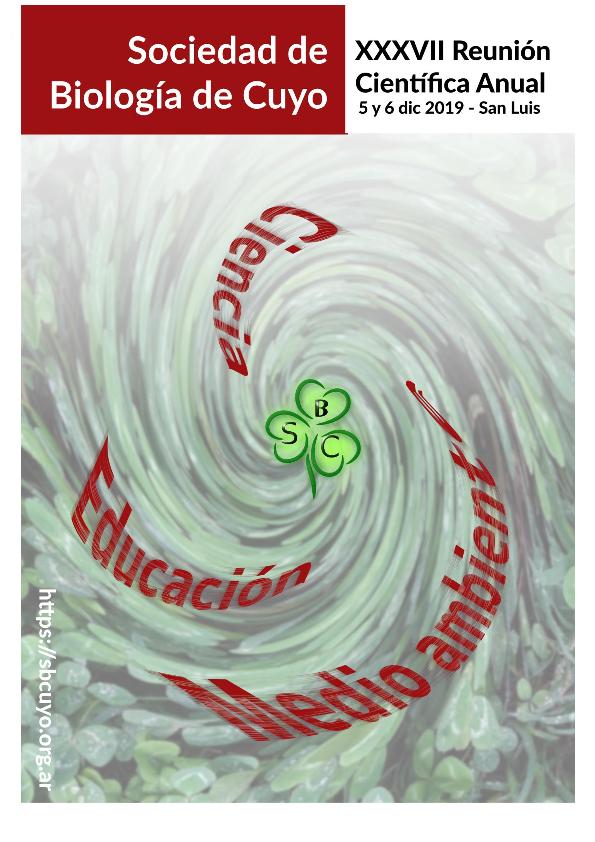Evento
Thyroxine excess increases fetal growth, placental and milk immune cell infiltration in late pregnancy and early lactation
Sanchez, María Belén; Moreno Sosa, María Tamara ; Neira, Flavia Judith
; Neira, Flavia Judith ; Pietrobon, Elisa Olivia
; Pietrobon, Elisa Olivia ; Soaje, Marta
; Soaje, Marta ; Valdez, Susana Ruth
; Valdez, Susana Ruth ; Jahn, Graciela Alma
; Jahn, Graciela Alma ; Mackern Oberti, Juan Pablo
; Mackern Oberti, Juan Pablo
 ; Neira, Flavia Judith
; Neira, Flavia Judith ; Pietrobon, Elisa Olivia
; Pietrobon, Elisa Olivia ; Soaje, Marta
; Soaje, Marta ; Valdez, Susana Ruth
; Valdez, Susana Ruth ; Jahn, Graciela Alma
; Jahn, Graciela Alma ; Mackern Oberti, Juan Pablo
; Mackern Oberti, Juan Pablo
Tipo del evento:
Reunión
Nombre del evento:
XXXVII Reunión Anual Científica de la Sociedad de Biología de Cuyo
Fecha del evento:
05/12/2019
Institución Organizadora:
Sociedad de Biología de Cuyo;
Título del Libro:
Libro de Resúmenes: XXXVII Reunión Científica Anual Sociedad de Biología de Cuyo
Editorial:
Socidad de Biología de Cuyo
Idioma:
Inglés
Clasificación temática:
Resumen
Thyroid dysfunctions cause reproductive disorders that lead to preterm birth and profound endocrine alterations during lactation with deficient milk production and quality. Currently, whether thyroid hormones (THs) modulate immune cells in maternal milk and placenta is unknown. Therefore, the aim of our work was to assess the influence of hyperthyroidism (hyper) on placental immune cells as well as its impact in pregnancy and lactation. To this end, 10-12 weeks old Wistar rats were injected with a daily dose of T4 (0.1 or 0.25 mg/kg s.c) to induce hyper, or vehicle in control animals. Rats were mated 8 days after starting T4 treatment and euthanized on day 19 (G19), 20 (G20) of gestation and 2 of lactation (L2). Placenta samples and milk were minced to reach single cell suspension and dyed. Then, resident placental and milk immune cells (CD45+, CD3+, CD11b/c+) were analyzed by flow cytometry and mRNA content of hormone receptors by qPCR. Also, placental (G19-20), fetus (G19-20) and offspring weights were measured. The fetuses of hyper 0.25 mg/kg mothers weighed more in G19 and G20 (p<0,001). The placentas of the hyper 0.25 mg/kg mothers were heavier than controls only in G19 (p<0,001). Furthermore, we showed a decrease in the expression of progesterone, estrogen and β2 thyroid receptors in hyper 0.1 mg/kg (p<0.05). On G19, the percentage of placental leukocytes was significantly higher in both hyper groups (p<0.05). On G20 we showed an increase in leukocyte infiltrate compared with G19 in the control (p<0.001) but not in the hyper group. We observed that hyper mothers had a higher mortality rate than the control group (14,14% and 3,18% respectively). Furthermore, the hyper group offspring presented lower weight on days 1 and 2 (p<0,001). Rat milk had an increase in the percentage of CD45+ cells in the Hyper (p<0,05). In addition, the absolute quantity of CD3+ cells/ µl increased in respect to the control group while the number of CD11 b/c+ diminished (p<0,05). These results suggest that T4 administration accelerates fetal development, changes placental sensitivity to ovarian steroids and impairs early lactation. Additionally, placental and milk leukocytes would be modulated by T4. To our knowledge, this is the first report that shows the modulation of resident immune cells by thyroid hormones.
Palabras clave:
thyroxine
,
T cells
,
placenta
,
lactation
Archivos asociados
Licencia
Identificadores
Colecciones
Eventos(IMBECU)
Eventos de INST. DE MEDICINA Y BIO. EXP. DE CUYO
Eventos de INST. DE MEDICINA Y BIO. EXP. DE CUYO
Citación
Thyroxine excess increases fetal growth, placental and milk immune cell infiltration in late pregnancy and early lactation; XXXVII Reunión Anual Científica de la Sociedad de Biología de Cuyo; San Luis; Argentina; 2019; 1-4
Compartir



